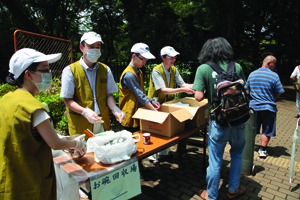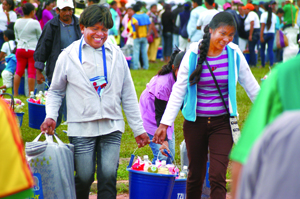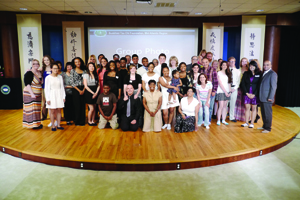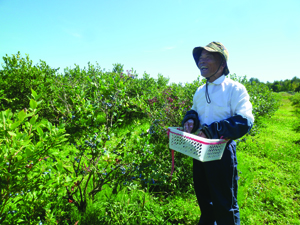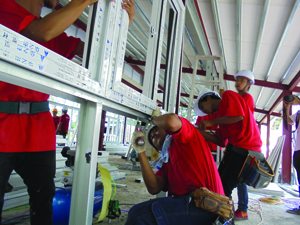

| Tzu Chi Events Around the World | ||||||||||
Japan Volunteers in Tokyo give out hot meals to the homeless twice a month at Yoyogi Park. One such distribution fell on July 21, which also happened to be “Umi no Hi” (“Ocean Day”). Umi no Hi is a national holiday that celebrates the ocean’s bounty and its importance to Japan, an island nation. Some Japanese took advantage of the holiday as an opportunity to volunteer with Tzu Chi.
Volunteers arrived at the park after ten in the morning and greeted the homeless people who had lined up for the meals. Volunteers Lin Zhen-zi (林真子) and Huang Su-mei (黃素梅) are long-time veterans of this program, and they have become friends with many of the meal recipients. They chatted naturally with some of the attendees, “It’s hot these days. Be sure to take good care.” They also shared tips with those who were volunteering for the event for the first time about how to interact with the recipients. Volunteer Li Su-ping (李素萍), who works for the immigration bureau, came to the venue with two of her colleagues, Sachiko Kamo and Patorishia Kan. Kamo said that she had heard Li describe Tzu Chi activities before and was glad she had come to experience it. Her job at the distribution was serving food to the homeless. She said that seeing Tzu Chi volunteers’ interactions with the homeless had inspired her to care for others more. Kan was also touched by what she had witnessed. She shared that she had long wanted to give back to society and that she hoped to attend the event again in the future. Xiao Nan (肖楠), from China, began working in Japan after finishing her studies here. She had heard about Tzu Chi from her family in China and had visited the Tzu Chi Japan branch office a month earlier. At the invitation of Tzu Chi volunteers, she came and served at this event. Her day job is normally quite stressful, so she had been worried that coming to volunteer instead of resting at home would make her even more exhausted. To her surprise, just the opposite happened. “Helping others brings a joy that is quite a different experience to me.” She said she would take the positive energy she gained from volunteering at the event back to her workplace, and in the future she would do what she could to give back to society. It was also the first time that Kaoru Hanada, a business owner, volunteered at the event. He was in charge of guiding people into the waiting line. Because of his wife, Jian Mei-li (簡美莉), who was from Taiwan, Hanada was very supportive of Tzu Chi activities. He feels that Japan needs more caring and giving groups like Tzu Chi, and he was happy and grateful to have a chance like this to contribute. “An old man like me should still try to do meaningful things, like this one,” he said. Malaysia Airlines flight MH17 had been shot down on July 17, just a few days earlier, so the volunteers asked everyone to pray for the victims. The volunteers also encouraged the homeless to call their families, who would be happy to hear from them and to know that they were okay. On this day, over 170 people came for the hot food. Volunteers also distributed towels made from recycled PET bottles to the homeless.
Bolivia Continuous heavy rains early this year devastated Bolivia. Low-lying Beni Department suffered the heaviest damage. Tzu Chi volunteers from the city of Santa Cruz visited Trinidad, Beni, twice to inspect the damage. Based on their assessment, they decided to hold an aid distribution on June 1. A team of volunteers from Argentina and Chile arrived in Bolivia on May 29. Along with local volunteers, they packed medical kits, one of the aid items to be distributed. On the evening of May 30, 27 volunteers embarked on a ten-hour bus journey from Santa Cruz to Trinidad. They reached Gran Mamoré Stadium, the event venue, at seven the next morning and began to set things up for the distribution. Thanks to the help of over 200 government workers, soldiers, and flood victims, six truckloads of relief goods—including rice, cooking oil, sugar and pasta—had already been packed. On June 1, the stadium bustled with aid recipients. Many people held up posters they had made to thank the Tzu Chi volunteers. Volunteers respectfully handed the supplies over to victims, along with their best wishes. Three thousand families, or 11,000 people, benefited from the distribution.
One recipient, Edward Rodriguez, was very grateful for the goods his family had received. There were twelve people in his family, and he had a 12-year-old daughter who could not move around easily because of an illness. “Thanks to Tzu Chi for helping so many people and making our lives easier.” Four volunteer doctors were on hand to help out at the event and take care of minor discomforts. For example, one of the aid recipients felt unwell because of high blood pressure. Gao Zhong-cheng (高忠成), a Chinese medicine doctor, gave her acupuncture treatment. Another patient had a stiff and sore neck and shoulder and could not raise her arm very high. After Dr. Cai Ming-ming (蔡銘明) treated her with acupuncture, she felt great relief. Amazed, she encouraged other people to try the treatment. It was a cloudy day, but the smiles on the victims’ faces as they carried their goods home lit up the hearts of the Tzu Chi volunteers. USA The Tzu Chi New Jersey branch established a scholarship in 1998 to assist needy high school graduates with a GPA of at least 3.0 to pay for a college education. The program was expanded in 2014 to include students attending special schools as well. In January, the branch sent out application forms to 390 prospective candidates, 86 of whom submitted their applications to Tzu Chi by March. Volunteers reviewed their information, visited their homes, interviewed them, and examined their needs to assess their qualifications before choosing this year’s 25 recipients.
On June 14, 18 of the recipients, from various parts of New Jersey and as far as Delaware and Philadelphia, arrived at the Tzu Chi office to receive the scholarship awards. The other seven students did not attend in person because they lived too far away or were otherwise engaged. Going to college is a dream come true and an exciting event for many young people, but it can be a real financial nightmare for poor students. Economic hardship has forced many companies to curtail or scrap their academic scholarships. The federal government also has reduced its financial assistance to students. Therefore, many high school graduates try to get as many scholarships as they can to reduce their burden. A Tzu Chi scholarship of US$1,000 might not seem like much given the high cost of a college education, but the money came from donations from all sectors of society. With so much love behind the scholarship money, the recipients might feel more encouraged and blessed as they pursue their education and dreams. Brea Brown, one of the recipients, volunteered at school and in her community in her free time. She will start attending Rutgers University in the fall of 2014. Brown was happy to learn that there was a Tzu Chi Collegiate Association chapter at the university. She said that she would become a member of the club. She would like to do her part to help others and contribute to society. Kaitlin Peltz came with her father to receive her scholarship. After watching a video clip on Tzu Chi, Mr. Peltz thanked the foundation for helping victims of Hurricane Sandy. He was also amazed by the huge combined power of the volunteers in Tzu Chi. Ashley Mogle, of Delaware, came with her parents and two sisters. She and her mother said that the event had been an education for them. They would read more about Tzu Chi on the Internet and tell their friends and relatives about the foundation and the good that it has done.
Canada A ten-acre farm in Richmond, British Columbia, has over 10,000 blueberry shrubs that are over 70 years old. They produced many tasty blueberries this year. Zhuang Hua-ren (莊華仁) and his wife, the owners, are devout Buddhists. They told local Tzu Chi volunteers that they would donate the blueberries on five acres of their farm to Tzu Chi to help the foundation carry out its missions.
To take up their generous offer, volunteers needed hands to pick and pack the fruit, solicit orders, and deliver the goods. They called for help, and many people responded. The picking started on June 21. To ensure consistency in quality, volunteers also sorted the berries. Then they weighed the fruit and gingerly packed it into boxes. The farm has flourished because of Zhuang’s hard work. He prunes and waters the plants, pulls weeds, fertilizes, and does everything else necessary for his shrubs to thrive. “All the blueberries here are organic. That’s beneficial for health,” observed volunteer Lin Pei-lin (林培霖). He said that he had not been into farming much, a quarter-time farmer at best, but he and his wife had come to Zhuang’s farm every day for the previous three weeks. The tan they’d developed made them look like real farmers. Chen Xiu-lian (陳秀蓮) had come to help for a week. “I pick all that is within my reach,” she said. She did not want the fruit to become overripe, fall to the ground, and be wasted. That would be a terrible thing and would let Mr. Zhuang down. Volunteer Weng Zhen-lun (翁振倫) said that he was grateful to the Zhuangs for allowing them to pick the fruit, the labor of their love, and for providing them with baskets to put the berries in during picking. He had received orders for more than 2,000 pounds. “I work on the farm until six in the evening, and then I deliver the fruit in top form to people in Richmond and Vancouver.” Volunteer Zhuang Wei-qing (莊惟晴) was another regular. “So many people have helped out in this endeavor. Some placed orders, some picked and sorted the fruit, while others prepared meals and delivered snacks to us.” All of that made her feel very warm inside. Even though sometimes she felt tired and would have liked to skip a day, the steady flow of orders kept her going Barely four weeks into the endeavor, the volunteers have fetched C$20,000 (US$18,300) from charity sales.
Myanmar Basic Education Primary School Htaw Twun is located in Thanlyin, an hour’s drive from Yangon. Children from kindergarten to third grade receive their lessons in a single, old classroom. The teachers all talk at the same time, so they raise their voices in the hope that their own students might better hear them over the sounds of other teachers’ competing instructions. Thus the teachers are often hoarse at the end of a school day. That’s not the only problem the school faces. Over the years the elements have aged the school building, which is also infested with termites, but local residents are powerless to improve the situation. Many farming families there can barely afford to send their children to school, let alone keep the school in better repair. Fortunately, the problems will be solved in September. Tzu Chi built three large schools in Myanmar after Cyclone Nargis hit in 2008, and volunteers continued to help needy people in the country by distributing goods and conducting other charity work. In 2010 volunteers distributed rice seeds in Thanlyin. In the process, they noticed the rundown buildings at local schools. After visiting 35 schools, they decided to build new classrooms for 12 schools in the town.
Construction commenced in March 2014. All buildings feature steel frames and green building materials. The first school is scheduled to be completed in September. Erecting buildings in this rural town has been a challenge in many ways, including transportation of the necessary materials and equipment and the lack of skilled labor. A group of skilled workers from Taiwan came to help with the construction. They were Burmese of Chinese descent who had earlier immigrated to Taiwan. They joined the project because they wanted to do something for their home country. The local community has been heavily involved as well. Villagers work on the project as a way to earn money and to contribute to an endeavor that benefits the whole community. “The school buildings that Tzu Chi is giving us have been built with materials and quality seen only at very large construction projects in Yangon,” said U Myint Khine, a carpenter who has two children in primary school. “This is a project that is going to benefit us for several generations.” |















|

